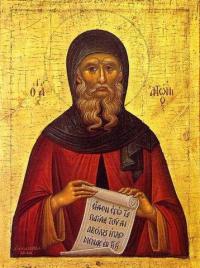
Feast day: 17 January
Anthony was born in Coma in Lower Egypt in 251. His parents were wealthy landowners and died when he was eighteen, leaving him in the care of his unmarried sister. He was inspired by Jesus' words:
"If you want to be perfect, go sell all you have and give to the poor, and you will have treasures in heaven."
Anthony gave some property to his neighbours, sold the rest and donated the money to the poor. He placed his sister with a group of Christian virgins and then went on to live an ascetic life. He began to associate with other ascetics, studying their lives. He lived in a tomb and was fed by the villagers. He suffered from conflicts with demons who tormented him with boredom, laziness and phantoms of women. Sometimes they beat him unconscious. Later he went into the desert to a mountain by the Nile called Pispir, now Der-el-Memun, opposite Arsinoe. There had been a long tradition of people who remained unmarried and who prayed, fasted and performed pious works, sometimes in their own homes or on the outskirts of cities. Anthony, however, was probably the first to venture into the desert. He lived in an old abandoned Roman fort for twenty years. He was again haunted by demons who appeared as wild animals, but he laughed at them. Food was passed to him through a crevice. Sometimes he gave advice but he never allowed anyone into his cell. Eventually the villagers broke down the door and Anthony emerged in perfect health. He went to Fayyum and confirmed the Christians there in their faith before returning to his fort. By this time his fame was spreading.
At this time Christians were being persecuted by the Emperor Diocletian. Anthony hoped to become a martyr himself and went to Alexandria in 311. He visited those who were imprisoned for their Christian faith and openly professed his own beliefs. At the end of his persecutions Anthony returned to his fort. However he had many more visitors and he moved further into the eastern desert. Here he was soon discovered. He began to organize his disciples into communities. Thus, though he was not the first hermit, he has been called the Father of Monasticism. The words of enlightenment from Anthony and his companions were collected into a book called the "Sayings of the Desert Fathers". After his death many men and women went out into the desert seeking a life of perfection and an alternative to martyrdom.
Anthony anticipated the rule of St Benedict by eighty years. Manual labour was part of his everyday life. He kept a garden and wove rush mats. He would visit the monastery on the outskirts of the desert by the Nile and then return to his own place. He was praised by the Emperor Constantine who wrote him a letter asking for prayers. St Anthony was unmoved but persuaded to reply to the Emperor since he was told, "Emperor Constantine loves the Church."
It is said that Anthony had a vision of an angel who was braiding palm leaves and commanded him to do the same, saying, "Anthony, do this and you will rest."" He obeyed the command and wove the tunic he had seen, and henceforth never suffered from boredom again.
In 338 he left the desert temporarily to refute the teachings of Arius who emphasized the Father’s divinity over the Son. Though Anthony was not particularly learned, he was able to confront the Arians.
When Anthony knew he was about to die he commanded his disciples to give his staff to St Macarius, one sheepskin cloak to St Athanasius and the other to his disciple St Serapion. He instructed them to bury him in an unmarked secret grave. St Anthony left no writings and probably spoke only Coptic but his sayings were translated into Greek. His biography was written by St Athanasius which helped promote his ideals throughout Europe in its Latin translations. Perhaps this saying of St Anthony sums up his vision:
"If we would despise the enemy, our thoughts must always be of God and our souls always glad with hope."
St Anthony, pray for us.